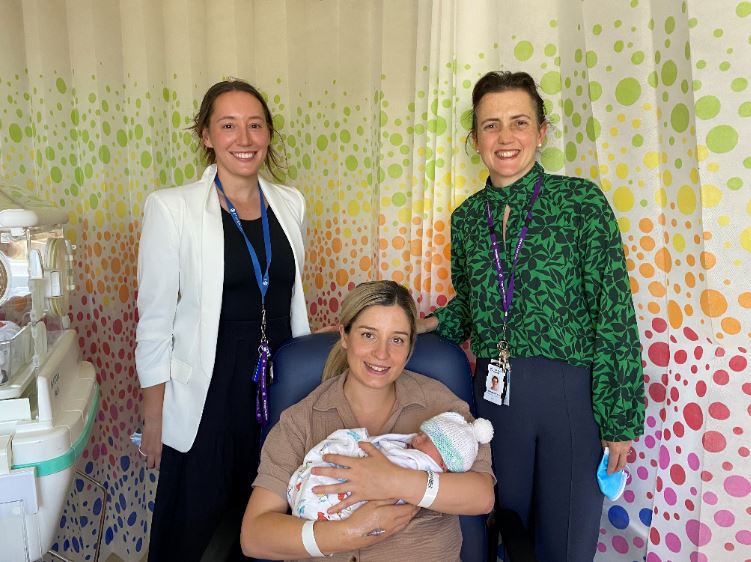Grampians Health researchers looking to find ways to safely reduce the risk of breathing problems for newborn babies
 Taegen Burnside, registered midwife and clinical trials coordinator, and Dr Natasha Frawley with Brittany Santilla and her son Max.
Taegen Burnside, registered midwife and clinical trials coordinator, and Dr Natasha Frawley with Brittany Santilla and her son Max.
Grampians Health has joined an international trial conducted by teams at Auckland University, the Liggins Institute and the University of Melbourne which asks the question: "Can we safely reduce the risk of breathing problems for newborn babies by giving corticosteroid injections to their mother before a planned caesarean section?"
Grampians Health established an obstetrics and gynaecology research team last year, and this study is the first clinical trial for the new team.
The team includes Head of Obstetrics and Gynaecology Dr Natasha Frawley and registered midwife and Clinical Trials Coordinator Taegen Burnside.
"Starting this team in partnership with the clinical trials unit means we get experienced research staff working alongside clinical midwives and obstetricians. This ultimately helps us have regional outcomes being studied in important international trials, so we can improve outcomes for mothers and babies in Ballarat and across the Grampians region," says Dr Frawley.
Across Australia and New Zealand, over 50,000 babies are born by planned caesarean section each year, and these rates are rising.
"We know that planned caesareans can be risky for babies. Some may need to be admitted to a neonatal unit for breathing support, which means mothers are separated from their baby after birth, which is not ideal for mother or baby," Ms Burnside said.
Regardless of how a woman gives birth, there can be risks for both mothers and babies. One disadvantage of planned caesarean is that babies born before labour has started are more likely to experience short term breathing problems in comparison to babies born by caesarean section after labour has started or by vaginal delivery.
"This trial is specifically looking at women who are birthing by caesarean section without labour, between 35 and 39+6 weeks gestation - which is late preterm and term babies. We want to be able to do everything we can to support both mother and child and give them the best outcomes before, during and after birth," Ms Burnside said.
"The particular drug we are using in this trial is routinely given to women at risk of preterm birth – prior to 35 weeks gestation – and it has been proven to significantly reduce respiratory morbidities in preterm babies. This trial builds on that knowledge and we're hoping it will significantly improve the wellbeing of many more babies after birth," Dr Frawley said.
Corticosteroids speed up foetal lung development by enhancing cell maturation. By giving pre-term and term babies who don't experience labour corticosteroids in the lead up to their birth, it is hoped that it will reduce the need to admit these babies for breathing support.
"It's very exciting that our obstetrics and gynaecology research team's first clinical trial will provide the first high-quality evidence on the balance between benefit and harm of corticosteroids in this setting and will reliably inform clinical practice for more than one in ten of all future births in New Zealand and Australia," Dr Frawley said.

